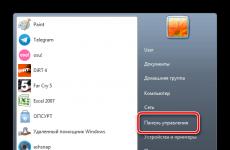Why won't Windows develop phones? Why Windows OS is no longer important to Microsoft. Lack of change and sluggishness
The digital application market is the main source from which the owner of a smartphone can install the necessary utilities and updates for them on the device. Malfunctions in its operation can cause significant inconvenience in the functioning of the device itself. However, if on Windows Phone The App Store doesn't work; this problem can be fixed fairly quickly.
Possible causes of the failure
Before you begin troubleshooting, you need to find out Why doesn't the store work on Windows Phone?. There may be several reasons for this:
- - system error;
- - reset settings;
- -Market cache memory is full.
The choice of tool to correct the malfunction depends on the factor that led to its occurrence.
What to do if a failure in the Store is caused by a system error
Often Windows Phone 10 store not working, and other versions of the operating system, due to a software glitch. In this case, it is necessary to eliminate it.
If problems with the Market are caused by system error, then a fault code should appear on the screen when you try to enter it. Thanks to him, you can find out what the problem means and how to solve it.
There are many error codes. Each of them talks about different types of malfunctions and has its own instructions for troubleshooting.
The store is not working due to a factory reset
Quite often, the user is unable to connect to the Digital App Market after performing a reset before initial settings manufacturer's plant. The thing is that when performing this operation, the password and login may be reset account Microsoft.
To solve this kind of problem, you need to log in to your account from your smartphone. If this fails, you can use your computer to recover the password for your account.

Also, if you cannot log into your account via PC, you need to create new account Microsoft and using its data to log in from the device. Moreover, all information about previously installed applications on this device will be lost.
How to clear Market cache
A full Store memory can also make it impossible to access it. In order to clean it, you will also need to use a computer.

Using your account information, you need to open the Store from your PC. In the search bar, you need to type the word “Run”. Then, from the results obtained, select the one that has the appropriate name. A separate input field will appear. In it you need to enter the command “wsreset.exe”. After confirming the action, the cache memory will be cleared.
The above methods are effective methods for troubleshooting digital Store problems. But if they do not help, and the connection still cannot be established, you should wait a while (at least a day) and try again. It is likely that the failure of the Market in this case is caused by the server, and not by the device itself.

Well-known Windows blogger Paul Thurot tries to make sense of the latest news regarding WP - and comes to disappointing conclusions.
Paul Turot - technical expert and Microsoft blogger
Last July, Paul writes, Microsoft essentially exited the smartphone market. Now the company... has left him a little more.
- Microsoft is de facto leaving the consumer smartphone market. The company admitted its failure in this area and will now focus on corporate clients. The irony is that when Windows startup Phone in 2010, Microsoft completely ignored the business side.
- Almost all Nokia employees who joined Microsoft in 2014 will leave the company by the end of this year. In 2016, only 1,850 “Finnish” employees will leave the company. Not so much - but most of the employees have already been fired during the two previous waves of “staff optimization”.
- Microsoft lost much more than $7.5 billion on the acquisition of Nokia. The actual amount of losses exceeds $10 billion.

Any one of these three facts is enough to have a very serious impact on Windows Phone as a platform. Now, writes Paul, unlike the situation last year, there is simply nothing to analyze - everything is clear without further ado. The blogger believes that the past year, rich in unpleasant truths about the platform, has made realists out of most WP fans. Yes, there are still particularly stubborn users who are waiting for the future revival of the system. But most Windows Phone fans seem to understand exactly what the truth is.
But the truth looks like this:
- Windows Phone as a platform doesn't matter. Currently, Windows smartphones occupy less than 1 percent of the global smart phone market; they do not have many of the applications and games that a modern user needs.
- Microsoft will continue to develop Windows 10 Mobile. Not to be confused with "Lumia" - Microsoft will only develop and improve the Windows 10 Mobile operating system. Why? Because it's just a SKU (product version) of Windows 10, and because it runs on the ARM hardware that modern mobile devices run on.
- A new smartphone from Microsoft will come out... maybe. It is unclear whether this device will be released under the Lumia brand (most likely not) or under the new Surface brand.
- Relax, no one is stopping you from using a Windows smartphone. Paul complains that he gets a lot of strange comments from users - for some reason they think that he is trying to convince them not to use Windows Phone. Not at all! Thurot simply suggests that we stop worshiping Windows Phone as a promising platform and something that can be recommended to friends and acquaintances.
“If you know what you're getting into, there's no problem. But stop pretending that Windows Phone solves problems that iPhone and Android can't. These platforms are now significantly superior to Windows Phone. Sorry".
From a Windows Phone fan's perspective, essentially nothing has changed: Microsoft will still support the platform they love, and they can continue to use the devices and maybe even buy new ones in the future. For the rest of the world - which, unfortunately for WP fans, includes 99.9% of users - not much has changed either. Most people can still safely ignore Windows Phone as before.
Presented a number of new products, united under the name “Surface”, the portal reports The Verge. The new family includes tablets, laptops, wireless headphones and even a smartphone that folds in half.
But one of the most important surprises of the event was the phrase from Microsoft CEO Satya Nadella:
"The operating system is no longer the most important product for us."
According to Nadella, his company will now focus on services and applications, relegating the Windows OS to the second or even third place. Considering that Windows is a landmark product for Microsoft, this decision, although quite bold, raises a number of questions.
Microsoft's CEO isn't saying that Windows is no longer part of the company's business, but he is hinting that the most popular desktop operating system no longer fits into its future. Microsoft's focus now is on Microsoft Graph, a dedicated developer platform that spans multiple devices and services, including Windows, Office 365 and Azure, for example.
“The most important thing for us right now is the application model and user experience. The way people create apps for the Duo and Neo [the new Surface products] will have a much bigger impact. higher value than just writing a Windows application or an Android application, because it will be connected to Microsoft Graph,” Satya Nadella said as he continued his speech.
Moreover, it seems that Microsoft had to abandon Windows in favor of Android, created by a competitor in . This is also supported by the fact that the previously presented surface smartphone Duo runs on Android based. At the same time, the head of the company's production department does not hide the fact that the choice in favor of Android was obvious - after all, a huge number of applications run on this OS.
Given Microsoft's disastrous experience with the Windows Phone operating system, the company clearly does not need another smartphone without applications.
Now she will have a whole store at her disposal. Play Store. Microsoft also hinted that it would cooperate with Google in the field of software interfaces.
At the same time, Panay denies that Windows is losing its relevance - according to him, for Android smartphones more convenient, that's all. However, if you look into the future, you cannot help but notice that more and more computer operations are gradually moving to mobile devices, and the CEO of Microsoft understands this.
Despite the fact that Windows is still considered the number one choice for the desktop, cross-platform is becoming a trend in technology, which means focusing on web technology rather than on the features of the “native” operating system. Microsoft is trying to follow this trend - this is confirmed by new phone based on Android, and, for example, Office, available for devices on the iOS platform.
“Microsoft recently presented new devices, including phones, tablets, tablets and laptops. However, this is not the main focus of the company, just like the Windows operating system, which has earned the company billions of dollars, the director of the analytical department of Freedom Finance Investment Company tells Gazeta.Ru. — Devices account for less than 5% of revenue, and Windows, which brought in 30% of revenue in 2010, now accounts for only 16%. The company noticed this and is ready to develop new areas - services and cloud business.”
According to Merkulov, a developer environment is now being developed that will help combine and integrate different operating systems, which is leading to a decline in the importance of Windows. The company will continue to focus on OS integration and develop cloud direction, which can open up new horizons for business.
“It’s difficult to further judge how the company will be able to develop this, but the trend towards moving to the cloud will prevail in the next five years... When compared with , the companies are somewhat similar, only Microsoft’s business is more focused on the business sector , and Apple on consumers and freelance designers,” the expert concluded.
It turns out that at the moment there is no need to worry about the near future for Windows, but it is clear that Microsoft will concentrate all its efforts on ensuring that its applications and services work on all platforms, regardless of the operating system. The time of death of Windows will not be announced soon, but this OS is gradually losing its leading position in the list of company priorities.
Everyone knows for certain that today the mastodons of the smartphone market are Androids from the well-known company Google and iPhones from Apple. Apple. And Microsoft tried to squeeze into this harsh market, however, it turned out, frankly, not very well. The company never managed to break into a leading position, but did it have a chance? And if so, what went wrong, and why, even with such powerful patronage in the person of a huge and successful company in other endeavors mobile platform remained on the margins of the market and is used only by “sophisticated amateurs”? About everything point by point below.
Reasons for failure
The failure of the Windows Phone OS was clear to many many years ago, and the inability to climb into the top of the “best” did not cause such a huge surprise among people. Technical indicators and the potential strength of the platform and its advantages are far from important here; in this aspect, the smartphone could easily compete. The stumbling block turned out to be an enemy that no one expected, namely: the corporate bureaucracy. And this is very, very sad. In your Windows time CE was not only inferior to its competitors, it was even ahead of them in many ways. However, when Microsoft woke up and realized that the market mobile devices future, there was already too much competition in this niche and two pillars of the industry: Apple and Android tightly occupied the niche and settled comfortably on it. And all sorts of advantages simply crashed head-on into a whole series of problems, which, most likely, hammered the last nail into the very box in which Windows Phone found itself:
- Firstly, the financial support and support for such a project is useless.
- Secondly, there is insufficient support for mobile software developers despite their efforts and efforts.
- The obvious weakness of the software in the system, convenient and new programs were not enough. Having worked on this point, developers could make the transition from PC to mobile device easier and smoother.
And that's not all, the problem is deeper. Remember the fable about the swan, crayfish and pike? A similar situation happened here. The fact is that various companies with very different focuses took part in the development. And Windows mobile needed to provide users with a universal smartphone that absorbed the best from PDAs and, in fact, mobile phone. Plus, the smartphone was simply obliged to synchronize with email and other services from Microsoft. So it turned out that in the pursuit of everything, nothing good came of it at once.
But that's not all. Microsoft simply did not control the development and production of the device. And this is at a time when the companies participating in this process have never really had anything to do with the mobile device market. As a result, the responsibility to develop a smartphone for the Win OS fell to the then unknown and inexperienced company NTS.
Microsoft and its Windows Phone. Or why Android and iOS won
I understand that just everything said above is enough for failure, however, this did not seem enough to Microsoft. So they complicated their situation with another problem, namely: a completely wrong choice policy target audience. Windows Mobile was only a small link in the entire corporation. And the focus of the platform developers shifted towards creating a semi-professional system. In the end, Windows Phone either competed with a brand for the mass user (Nokia), or with a company that is more focused on a more professional user (Blackberry). Although it would be correct to choose the first option, because Microsoft creates its products for a mass audience, it turned out the way it turned out and nothing can be done.
The developers entertained the hope that people would buy their device based on Microsoft's OS because of the company's recognition and trust in Microsoft, since people had been using their other products for quite a long time. But the users were first of all struck by the frankly poor design of the device, and then they assessed the scanty functionality of the device, turned around and retreated to the shelves with “apples” and “green robots”.
It would seem that a breakthrough idea is a smartphone, the ability to type with one hand. But users are accustomed to two-handed input and perceive this initiative as bad form. And needless to say, while chasing innovations with the keyboard, Microsoft forgot about the touch screen. Funny? No, it's sad.
The company's business plan and behavior in promoting the device would have worked if they were selling standard software and not a smartphone. In the end, the company decided to impose its vision of the web on the user, while Google and Apple simply did everything the same as on a computer in order to simplify the user’s life.
So, in fact, all this together led to the fact that Windows background failed mercilessly and now it has infinitely little chance of being revived and breaking into the market. Only a total rebranding and, perhaps, prayers will help. You can't do without prayer!
MOSCOW, July 29 – RIA Novosti, Natalya Dembinskaya. In mid-July, big news came from Microsoft: the company officially stopped supporting the mobile operating system. Windows systems Phone, which still powers millions of devices. The corporation had to admit: smartphones do not bring it any profit. IN recent years Windows Phone's market share has been steadily declining, and has now almost bottomed out at 0.1%. Why there was no place at all for the operating system in the market, why defectors to Android blame Windows Phone, and whether Microsoft will be able to take revenge from Google and Apple - in the RIA Novosti material.
Not a bad start
Immediately after its introduction in 2009, Windows Phone managed to take a significant market share - almost 10%. At that time, the mobile market was dominated by Symbian, on which the first Nokia smartphones ran - it occupied more than 50% of the market, the second largest player was the RIM mobile OS of the then popular manufacturer Blackberry - famous phones with a full qwerty keyboard (20.9%). Android was just trying to find its place in the sun, occupying only about 4%.
Just in case, Google bought the unprofitable startup Android Inc., which was developing an operating system for wearable devices, back in 2005 and remembered about it only in 2007, when Steve Jobs introduced the first Apple iPhone.
Google quickly realized: the smartphone market is almost empty, and expensive Apple devices will not be able to fill it entirely.
Android's meteoric rise
At the end of 2009, confusion began in the smartphone market. Nokia by that time had already slowed down the development of Symbian and relied on Windows Mobile. And Google, in turn, reached an agreement with the Taiwanese manufacturer HTC. The first device under Android control became the HTC Dream smartphone, which was a resounding success.
iOS and Android began to develop rapidly, but Apple's position, which prohibited third-party companies from using iOS, did not work in its favor. In 2011, with the release of Ice Cream Sandwich, Android was already called “the most advanced operating system,” manufacturers Samsung smartphones, Alcatel, Philips, LG began to migrate en masse to the new promising platform. IN result Android took away almost 50% of the market, displacing all the old-timers from it in one fell swoop. Analysts began to consider the rapidly falling share of Symbian and RIM together in the “other OS” category.
On the battlefield, Android, Apple and Windows Phone were practically the only three left. The latter confidently stayed afloat, largely thanks to the release of popular smartphones Nokia Lumia, which gave a second life to the Finnish phone manufacturer itself.
Devices on Windows based Phone was also produced by LG.
Nokia got mad at Microsoft
However, the Finns soon began to show dissatisfaction. In 2013, Nokia Vice President Brian Biniak blamed Microsoft for the lack of competitive applications for Windows platforms Phone. It is for this reason that sales of Nokia Lumia have declined, he assured.
The irritation eventually resulted in the transition to Android. So far, some HP and Acer models are running the latest version of the Windows Mobile 10 platform (its support, observers believe, will be discontinued soon, and Windows smartphones will finally die by 2021).
In 2015, the new head of Microsoft, Satya Nadella, officially admitted the failure of Windows Phone.
“The smartphone boom has shown that Windows Phone is significantly behind Android and iOS, and we are late for that train,” Nadella said.
Closed file system
What exactly led to manufacturers and application developers starting to abandon Windows Phone and opt for Android?
Ballmer believes Nokia acquisition will accelerate Windows Phone growthSpeaking about the recently announced deal to buy Nokia's smartphone business, Ballmer said it would "accelerate the growth of Windows Phone and strengthen the overall device ecosystem."Experts consider the main disadvantage to be primarily the underlying closed file system, which causes application compatibility problems and prevents them from working properly. Unlike Android, Windows interface Phone and Windows Mobile - limited opportunities to configure applications. Not on the smartphone Google services, it is inconvenient to work with setting up contacts there. And finally, there are many fewer applications for this platform compared to Android.
“Success is a terrible teacher,” Microsoft founder Bill Gates once said. The corporation itself, a long-time leader in the PC operating systems market, has stepped on the same rake. As it turned out, Microsoft was not ready for the advent of the post-computer era.
"Google and Apple have moved forward with modern operating systems, and Microsoft continued to treat mobile devices as a third-party by-product,” observers state.
Lack of change and sluggishness
Experts point out that there have been no changes since the advent of Windows Mobile 6.1. iOS and Android updated their design and functionality every year. There was no talk about this in Windows Phone - the system remained monolithic and static.
“What kind of personalization? This is the eternal strict office style, the Explorer web browser and the permanent cut-and-paste function,” ironically notes the technology portal Quora.
Application developers quickly realized that their products looked much more attractive on fast-growing platforms than on Windows. Now at Windows directory Phone Store only about 165 thousand applications. For comparison: there are about 900 thousand of them in the AppStore, and Google Play- almost a million.
WITH the advent of Windows Phone 7.5 Microsoft tried to catch up, but it was too late. As a result, Microsoft found itself in the dust with Windows Phone 8: even Nokia’s high-quality hardware did not help, observers say.
What's next
IDC analysts have scheduled the "funeral" of Windows Phone for 2021 - by then it will completely disappear from the market, including the last one Windows version Mobile 10. In the meantime, Microsoft does not intend to say goodbye to it and is releasing Microsoft Lumia phones based on it (in 2014 it bought Nokia’s mobile device business for 5.44 billion euros).
However, in the near future Microsoft is going to “kill” Lumia and release its own new smartphone Surface Phone still has the same tiled interface. In April of this year, the company assured that it would reconsider its strategy and return to the mobile market with a new vision and new ideas. The market, however, has no doubt that Microsoft will not be able to step into the same river twice.






